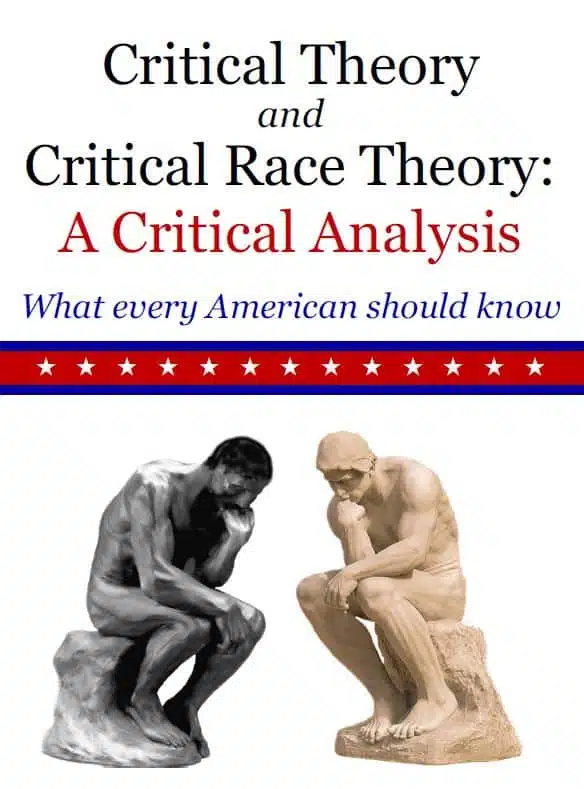📄The Areopagus Update – Aug/Sept 2021
An excerpt from Critical Theory and Critical Race Theory: A Critical Analysis by Jefrey Breshears
The Bible and Critical Race Theory
Critical Race Theory is not only blatantly Marxist, racist and antiAmerican, but it is transparently anti-Christian according to the following criteria.
(1) An anti-Christian ideology. Like critical theory in general, critical race theory labels and judges individuals primarily (or exclusively) according to their skin color. Conversely, biblical Christianity holds that followers of Christ should treat everyone as an individual – not as a member of some broad sociological (and stereotypical) group. In the words of the African-American pastor and author Voddie Baucham:
Our problem is [Marxist] “social justice” versus [true] biblical justice … The current concept of social justice is incompatible with biblical Christianity. [Fault Lines (Salem Books, 2021), p. 5.]
Christians must be clear and unequivocal: CRT is an innately evil, racist and indefensible ideology. As such, it is every bit as despicable as the white supremacy of the Ku Klux Klan or the Aryan racism of the National Socialist German Workers Party (Nazi). However, the point should be emphasized that many who are sympathetic to CRT are not evil people. Many are sincerely concerned about the state of racial tensions and conflict in America which they associate with traditional American racial and social injustice. But unfortunately, they are ignorant, naive and misguided pawns of those who are hell-bent on using CRT to divide us along racial lines and fundamentally transform America into a secular socialist state. The stakes could not be higher. As Voddie Baucham warns, “The United States is on the verge of a race war, if not a complete cultural meltdown….”
(2) A biblical view of race. A biblical view of race is conditioned by two foundational principles:
First is the doctrine that all human beings are created in the imago Dei the image of God – as set forth in Gen. 1:27: “So God created man in his own image… male and female he created them.”
Second is the inference that Christians should be post-racial in their attitudes toward all people. In Gal. 3:28 the apostle Paul wrote: “In Christ there is neither Jew nor Gentile, slave nor free, male nor female.” If race had been a serious social issue at the time, Paul would probably have added, “In Christ… there is neither white nor black nor brown.”
The Bible teaches racial equality, and it is patently unChristian to judge others on the basis of their skin color. As Christians, our identity comes from our relationship with God through the saving grace of Jesus Christ and the derivative faith and character that we develop throughout our lifetime. We are created as individuals, and God judges us as individuals. Our self-identity should come through a realistic awareness of who and what we are as a unique person – not our racial or ethnic heritage nor our sex.
That being the case, racial identity is nothing for which one should be either proud nor ashamed. Racial identity is simply a fact of nature. Human beings do nothing to earn or deserve to be born white, black, brown, etc., any more than they earn or deserve to be born male or female. For reasons we cannot know, God providentially chose to implant our soul within a particular body in a particular place and time in history (ref. Acts 17:26). “Pride,” in the positive sense of the word, is simply a sense of satisfaction (and hopefully, a sense of gratitude) that we develop as a result of accomplishing something meaningful in life. Therefore, the idea of “racial pride” – or for that matter, racial shame – is frankly nonsensical.
Christian social ethics emphasizes that there are absolute and universal standards of right and wrong, decency and civility. The Bible does not condone moral relativism on any basis – be it racial, ethnic, cultural, social class or gender. Traditionally, different racial and ethnic groups sometimes have their own distinctive mannerisms, customs, etc., but these usually have nothing to do with basic morality and ethics. If we truly believe in racial equality, then we hold all people to the same moral and ethical standards.
So while it is good to be sensitive to the unique life experiments of others, it is not good to patronize or excuse anyone’s bad behavior for any reason regardless of their race, sex, nationality, socio/economic status, or any other factor. Good and evil are not socially dependent. To think and act otherwise is to rob people of their individuality and their inherent dignity, which is dehumanizing and insulting. Furthermore, to grant exceptions to certain people based on their racial identify is itself racist.
(3) Sin is personal and universal. Scripture is clear that sin transcends race, sex, ethnicity, social class, and all other factors. The Bible holds everyone to the same general standards of morality regardless of social class, sex, race, ethnicity, or any other distinguishing characteristics. Sin only becomes “institutionalized” or “systemic” because human beings are themselves egocentric sinners – “rebels against God,” as C. S. Lewis once noted….
[NOTE: Critical Theory and Critical Race Theory: A Critical Analysis is available on Amazon.com.]


